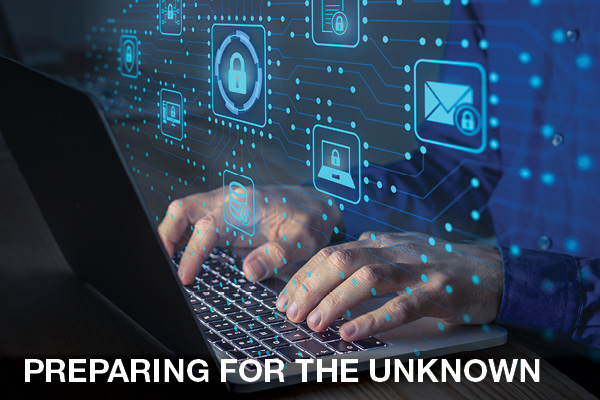2022 News
Digitizing Your Business Prepares You for the Unknown

Unplanned events can have a devastating effect on any business. Smart companies realize it’s critical to have both technology and planning in place to speed incident recovery and protect people, assets and earnings.
For many small and medium-sized businesses, the statistics paint a grim picture:
- A full 40% never reopen after a disaster
- Of those that do, 25% fail within one year, according to the U.S. Federal Emergency Management Agency.
- Additionally, ready.gov has estimated that 63% of companies have no process in place to bounce back after an emergency.
Defining a Strategy
Business continuity planning shifts the focus from the emergency itself to identifying and protecting vital processes within the organization. This means defining a strategy to maintain operations to ensure critical business functions don’t come to a halt. Every organization’s response blueprint will contain a unique combination of risk, incident, crisis and continuity management features.
“No matter the operational context, resilient companies proactively plan to overcome the consequences of uncertainty,” says Daryld Karloff, LEED AP, Executive Vice President of Building Services at Baker Group. As one of the Midwest’s largest multispecialty contractors, Baker Group works with dozens of clients to ensure even the most complex systems remain operational in a crisis.
“How organizations plan for — and neutralize — the potentially devastating impacts of emergency situations is critical to a business’ very survival,” Karloff continues. “Digital tools are leading the way to better outcomes.”
Even crises like climatic events, natural disasters and other catastrophic events beyond our control have impacts that can be anticipated, evaluated and mitigated. The technological capabilities now available can actively boost business continuity and viability in the face of these unanticipated events. Those who choose to ignore foreseeable risks, either intentionally or through complacence, will make their consequences worse.
Taking Advantage of the Technology
Cutting-edge digital platforms combine automation sequences with advanced analytics and remote connectivity to offer companies the visibility they need to identify and minimize potential vulnerabilities. Leveraging digital technology gives leaders mission-critical data to help them prepare in advance for quickly emerging disasters. By anticipating emergencies and running mitigation scenarios in advance, businesses can prioritize and execute more effective crisis response tactics, thereby reducing risks for their operations, employees and customers.
It cannot be stressed enough: We need to anticipate the inevitable.
When traditional business functions and channels are impacted during a crisis, the value of a digital operations strategy suddenly becomes obvious, but being prepared means implementing the critical infrastructure before disaster strikes. For example, combining local digitization with remote cloud connected services can ensure operational data is up to date, centralized and stored in a secure, readily available digital vault. This data might include fully cataloged physical and production assets so management has visibility into the each business process. This is the first step to returning to full operations. Digital technologies give stakeholders access to more accurate and complete information so they can reduce guesswork and implement an effective business continuity plan.
“One of the benefits of connectivity in our digital world is that technology allows speed, agility and knowledge in times of crises,” Karloff says. “Unplanned events don’t respect regular work hours, holidays or weekends, and a resilient organization must be willing and able to engage effectively at a moment’s notice.”
An All-Hands-On-Deck Approach
Apps and mobile crisis platforms can activate key staff immediately and give them direct access to essential information that helps them quickly coordinate business continuity efforts while enabling team members to identify their role, location and prioritize activity quicker than ever before.
In addition to enabling many employees to work off-site, collaboration applications and virtual/augmented reality software offer the potential for remote service professionals who can access real-time status and condition updates and provide timely troubleshooting guidance.
“Adaptable companies use planning and digital strategy to avert crisis,” Karloff says. “They utilize connected technology that will help them weather the storm. This becomes a competitive advantage as they return to full production before their competitors.”
And just as trust in an organization can be irreparably damaged by disruptions and poor incident management, so too can confidence in a brand be greatly enhanced by successful crisis resolution that boosts the customer experience. Today’s stakeholders expect prompt, real-time updates of a company’s response procedures, mitigation scenarios and best practices that state-of-the-art digital easily allow.
Karloff adds: “Owning the narrative is a key plank in a resilient organization’s ability to reassure customers and employees that their incident response action team is taking immediate and effective action.”
***
With more and more digital tools becoming available each day, it has become easier to manage many building operations remotely. This spurs efficiency in managing a crisis at a mission-critical facility.
Today’s technology allows organizations to leverage digitized building infrastructure and cloud-based analytic tools to:
- Enhance remote workplace collaboration, virtual process management and real-time connectivity
- Practice running mitigation scenarios in advance to prioritize action plans
- Enable on-site employees to get help troubleshooting their issue from remote service professionals who can access real-time status and provide timely guidance.
Learn more about how the Baker Group Building Services team can assist you in preparing systems — and your response team — for a crisis.
About Baker Group
Baker Group is a commercial and industrial specialty contractor based in Ankeny, Iowa. With more than 1,000 employees, Baker Group is the Midwest’s premier full-service specialty contractor providing mechanical, industrial, sheet metal, electrical, building automation, process automation, security systems, fire alarm systems, parking/revenue controls and 24/7/365 service. For more information, call 855.262.4000 or visit www.thebakergroup.com.
News
Best of Des Moines 2024

Baker Group was recognized by readers of the Des Moines Business Record for Des Moines' Best Mechanical Contractor for the 18th consecutive year.
